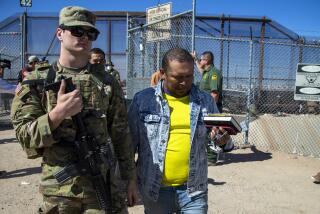Iraq’s plans for referendum on U.S. pullout fades
- Share via
BAGHDAD — Plans to hold a referendum that could have accelerated the withdrawal of American forces have quietly been shelved, as even those Iraqi politicians who were pushing for the poll conclude that it no longer would be a useful exercise.
Sunni Muslim politicians had wanted the referendum on the U.S.-Iraqi security pact to be conducted in January, at the same time as national elections. But with the clock ticking on preparations for the elections and the parliament still deadlocked over a new election law, there no longer is time to also draft and approve the legislation required to simultaneously hold a referendum, legislators say.
Perhaps more significant, the political will to hold a referendum appears to have evaporated amid the realization that U.S. troops are leaving anyway, and that it may not be in Iraq’s interests to have them pull out even sooner.
“The political blocs are no longer interested in this issue. They want to ignore it because they are busy with the elections. They don’t see it as something they could use to their advantage,” said Salim Jabouri, spokesman for the Iraqi Accordance Front, the largest Sunni bloc in parliament, which previously insisted on a referendum.
If the security pact were to be rejected by voters, U.S. troops would have to pull out of Iraq completely within a year, 11 months earlier than the deadline specified in the agreement. But American troops have already withdrawn from the cities, and all combat forces are to leave by August.
Troop levels have been reduced by 23,000 since January, to 120,000, and are scheduled to fall rapidly after the January elections, reaching 50,000 by August, U.S. officials say.
The security pact was negotiated during the Bush administration amid widespread Iraqi suspicions that U.S. forces had no intention of leaving. Indications that the Obama administration is serious about getting out have soothed those concerns, officials say.
“The Iraqis in general are no longer asking for a referendum because we see positive signs, namely the withdrawing of American troops,” said Jaber Mashhadani, spokesman for Iyad Samarrai, the speaker of parliament. Samarrai also had supported the referendum.
Though some Iraqis would like to see U.S. forces leave sooner, others are already growing anxious about their impending departure.
“We still have concerns that Iraq does need American forces to be on the ground. The challenge of Iran still exists, and also the people are not confident in the performance of the Iraqi security forces,” Jabouri said. “I can’t say we want the Americans to stay [until the deadline] because that could cause some misunderstandings. But I will say that if they stay, it will have its advantages.”
It is possible that the parliament elected in January will revive the referendum plan, but many lawmakers would argue strongly against it, said Sami Askari, a Shiite Muslim legislator who is close to Prime Minister Nouri Maliki. It could take months of political bickering for a new government to be formed, and the earliest a referendum could be held is probably next summer.
“The American forces are already leaving,” he said. “Why spend hundreds of millions of dollars to hold a referendum and send them home a few months early?”
--
More to Read
Sign up for Essential California
The most important California stories and recommendations in your inbox every morning.
You may occasionally receive promotional content from the Los Angeles Times.












